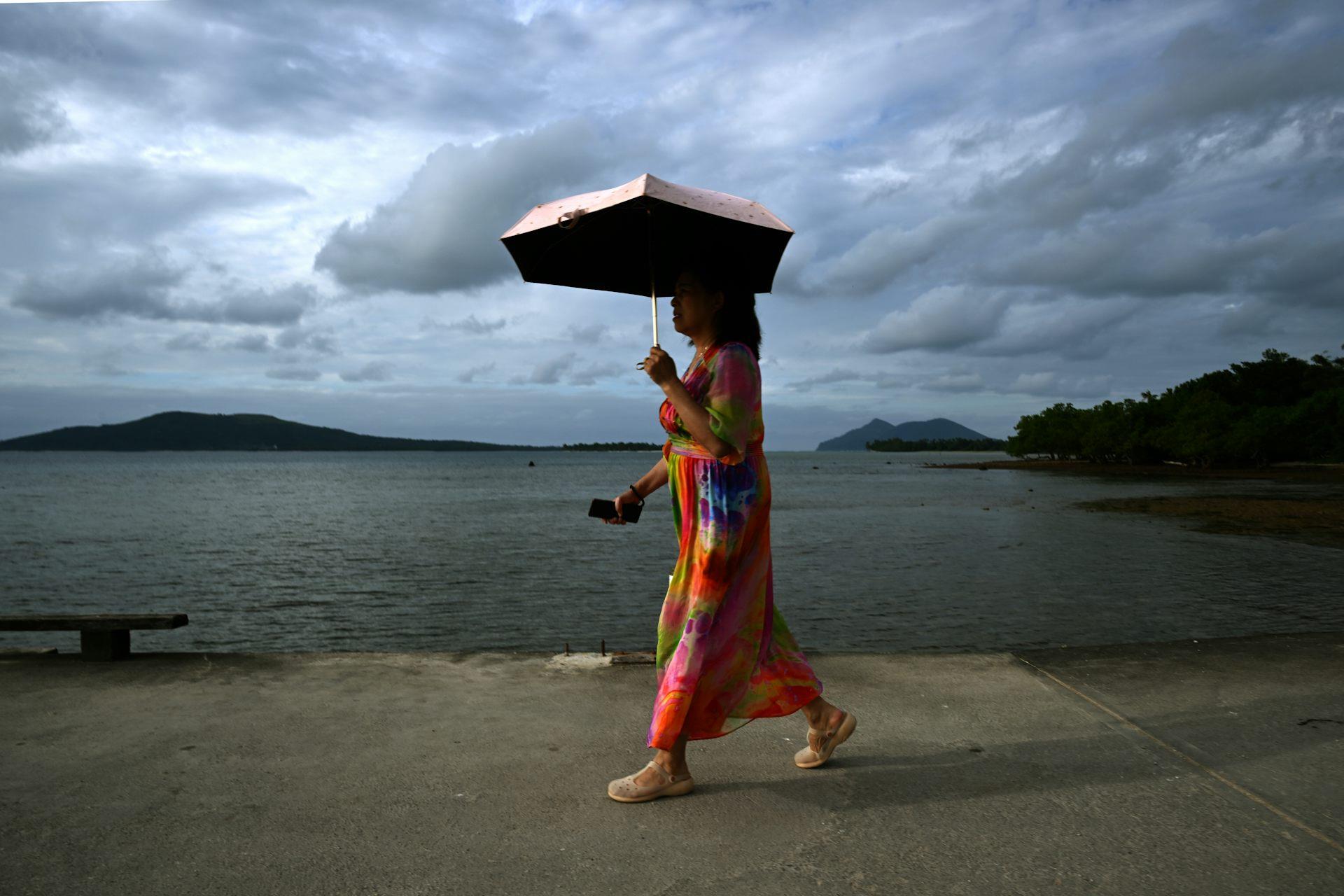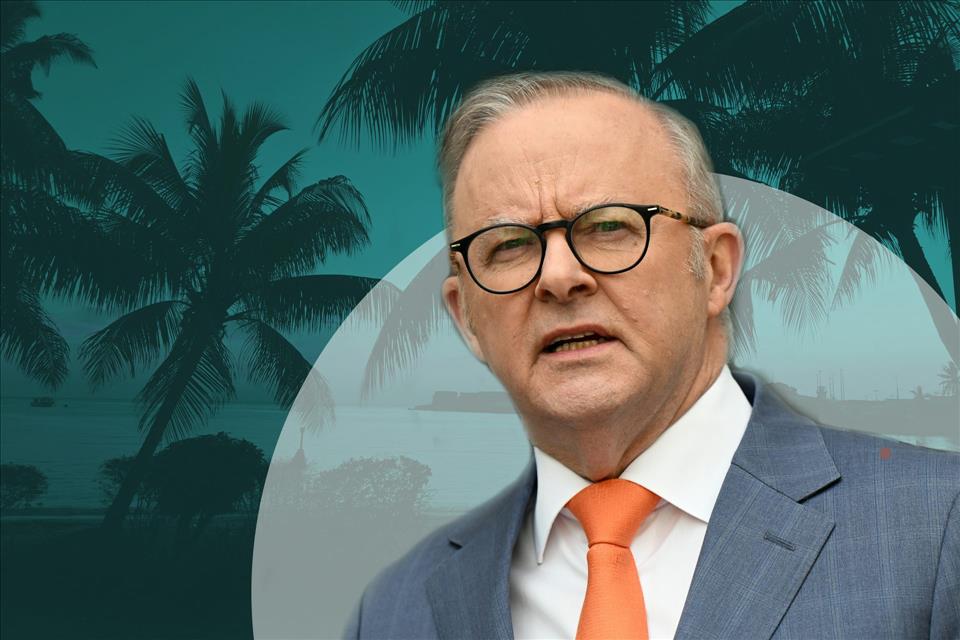
Fossil Fuel Expansion Or Pacific Security? Albanese Is Learning Australia Can't Have Both
The main purpose of Albanese's visit was to attend annual leaders' talks known as the Pacific Islands Forum . On the way, Albanese stopped in Vanuatu hoping to sign a security agreement – but he couldn't ink the deal.
I am in the Solomon Islands this week to observe the talks. I saw firsthand that Australia clearly has its work cut out in its quest to lead regional security – and our climate credibility is key.
Pacific countries say unequivocally that climate change – which is bringing stronger cyclones, coastal inundation and bleached coral reefs – is their single greatest threat . If Australia's geo-strategic jostling is to work, we must show serious commitment to curbing the dangers of a warming planet.

Climate change is the biggest threat to the Pacific. Pictured: A woman walks along a wharf on Efate Island, Vanuatu. Joel Carrett/AAP Australia's strategy tested in the Solomons
The location of this year's talks – Solomon Islands' capital, Honiara – is a stark reminder of Australia's geopolitical stakes amid rising Chinese influence in the region.
The Solomon Islands signed a security deal with China in 2022, which set alarm bells ringing in Canberra. Penny Wong – then opposition foreign minister – described it as the worst failure of Australian foreign policy in the Pacific since World War II.
Since then, the Albanese government has sought to firm up Australia's place as security partner for Pacific countries by pursuing bilateral security agreements with island nations. So far, it has completed deals with Tuvalu , Papua New Guinea and Nauru .
On his way to the Solomon Islands, Albanese stopped in Vanuatu hoping to sign a security agreement which reportedly included A$500 million over ten years to address worsening climate impacts. But that deal was postponed. Members of Vanuatu's coalition government were reportedly concerned about wording that could limit infrastructure funding from other countries, including China.
Albanese had more success in Honiara, where he advanced talks with Fiji's Prime Minister Sitiveni Rabuka for a new bilateral security pact .
Working with island nations to tackle climate change has become key to Australian strategy in the region. This week Albanese also joined Pacific leaders to ratify a regional fund intended to help island communities access international finance to help adapt to climate impacts. Australia has already pledged $100 million for the project, known as the Pacific Resilience Facility.
Leaders including Prime Minister Anthony Albanese (front row, second from right) pose for the Poppy Johnston/AAP
Australia is bidding to host the COP31 United Nations climate talks in partnership with Pacific countries in 2026. Pacific leaders formally restated support for Australia's bid this week.
Palau President Surangel Whipps Jr said an Australia-Pacific COP had broad support from the rest of the world:
Whipps also championed an initiative for the Pacific to become the world's first region to be powered 100% by renewable energy .
Pacific Island countries spend up to 25% of their GDP on importing fossil fuels for power generation and transport. As the costs of renewable energy and battery storage quickly fall, Pacific countries could save billions of dollars by making the clean energy shift.
Albanese this week appeared to acknowledge regional concerns about climate change, saying taking action was“the entry fee, if you like, to credibility in the Pacific”.
But the real test is whether Albanese can follow words with meaningful action.
Palau President Surangel Whipps said an Australia-Pacific COP had broad support. He is pictured here at last year's forum. Lukas Coch/AAP The work starts at home
Albanese's Pacific visit comes amid heightened scrutiny of Australia's efforts to curb emissions.
The government must set Australia's 2035 emissions reduction target this month. The latest reports suggest the commitment may be less ambitious than Pacific leaders, and many others, would like.
Pacific leaders also expect Albanese to curb fossil fuel production for export. Australia's biggest contribution to climate change comes from coal and gas exports, which add more than double the climate pollution of Australia's entire national economy.
However, in coming days the federal government is expected to approve Woodside's extension of gas production at the Northwest Shelf facility off Western Australia, out to 2070. The decision could lock in more than 4 billion tonnes of climate pollution – equivalent to a decade of Australia's annual emissions.
All this comes in the wake of a landmark legal ruling in July this year, when the International Court of Justice (ICJ) issued an advisory opinion confirming countries have legal responsibilities for climate harms caused by fossil fuel exports.
Vanuatu led the legal campaign. In Honiara this week , Vanuatu's climate minister Ralph Regenvanu reiterated that Australia must heed the ruling, saying:
Albanese may have taken on board some of the Pacific's concern about climate – and made a little progress at this week's Pacific Islands Forum. But there is work to do if Australia is to be seen as a credible security partner in the Pacific – and that work starts at home.

Legal Disclaimer:
MENAFN provides the
information “as is” without warranty of any kind. We do not accept
any responsibility or liability for the accuracy, content, images,
videos, licenses, completeness, legality, or reliability of the information
contained in this article. If you have any complaints or copyright
issues related to this article, kindly contact the provider above.





















Comments
No comment